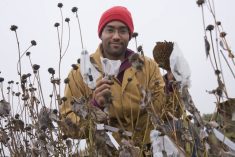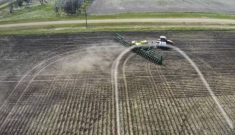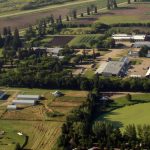Some people are driven to learn constantly. Clearly at 54 years old, Dan Wester is one of them. In the last few years, Wester has taken extended courses from the George Morris Centre as well as executive training through Texas
A&M University, and he has signed on for a multitude of workshops and seminars. And that’s just a start.
In the last 12 months alone, Wester has listened to nearly a dozen university courses on tape while driving tractor on his Tilley, Alta. farm, and he has read voraciously on subjects from Greek mythology to classic literature.
Read Also

How scientists are using DNA and climate data to breed crops of the future
A method for forecasting how crops will perform in different environments so that plant breeders can quickly select the best parents for new, climate-resilient varieties.
“I love learning,” says Wester.
Probably he didn’t have to say it. In fact, compared to many farmers, Wester’s pursuit of learning opportunities might seem almost obsessive. Or maybe it seems like a hobby that has little if any bearing on how he farms.
Then Wester explains why he’s so hooked, and it sounds a whole lot more practical.
“Most people who take these courses are always on the lookout for ways to improve,” Wester says of the farmers he gets to know while learning.
“Other people ask, Why? What’s wrong with what I’m doing now?”
Of course, Wester has acquired some very concrete skills too, though not so much from normal school education. He stopped after he graduated from high school and has been farming ever since. (He, his wife Linda and son Dale grow 3,000 acres under irrigation, specializing in forages and seed production.)
Instead, Wester has used further education to build his capabilities. At Olds College’s former CAPA course he learned about financing. Five years ago he built a strategic plan while taking the CTEAM program through the George Morris Centre. At the Texas A&M program called TEPAP, he took his benchmarking to a new, more global perspective.
However, the most important thing he gained in all these continuing education experiences has been the network of top-notch farmers, researchers and agribusiness leaders.
Motivate
Wester was so impressed with his fellow classmates that he continues to attend TEPAP alumni events. By rubbing shoulders with highly successful, large-scale farmers from across the country and the globe he’s deriving motivation by proximity.
“A lot of these people are just really inspirational… people who started in the ’90s who are farming 20,000 acres,” says Wester.
Meeting people who are so successful helped put his own medium-size business in perspective. “More is possible,” Wester says. “It allowed me to ask myself, ‘Why can’t I farm another quarter of land?’”
After Wester spent a week sharing ideas with some of the other participants of TEPAP, he was invigorated and recharged. At an age when most farmers are thinking about slowing down, he jumped into a five-year plan to expand the farm.
Share
This enthusiasm also comes from the chance to ask questions and learn how these farmers manage so much. Wester was able to delve into how different business models work for a variety of sectors and sizes. “I can’t buy advice like that anywhere,” he says.
Wester was humbled by the scale of the decisions that many of the co-students make on a given day. And he was humbled too by the reflection that all these farmers were there to learn too.
The TEPAP course material itself covers everything from managing people and finances to target marketing and lease agreements.
For example, Wester could ask a fellow TEPAP participant from Kentucky what he has learned about dealing with 97 landlords. Some landlords really appreciate having their driveway cleaned out. Others’ main concern is that their properties look good. One wants a place to hunt. It’s not all about money. “I’ve learned to ask my landlords what they want and now people come to me asking if I want to farm it,” says Wester.
Osmotic Bravado
The negative to this kind of networking is that it can encourage farmers to take bigger risks, and not everyone can operate on that level, says Wester. “I’ll never be like Kip Tom growing seed corn for Monsanto or milk 42,000 cows.”
Part of the balancing act of farming is knowing yourself. Most important is to do a reality check on what you want versus what you are able to do. Are you constantly pursuing success? Or do you want to balance lifestyle of family and relax time?
“I don’t think you can learn that,” says Wester. “It’s a lot to do with how you are wired.”
After the week in Texas, Wester summarized that you can’t replicate the innate ability to turn opportunities into money. He believes that farming is part science — it’s the part of farming that you can measure and replicate — but the other part is art and intuition. You have it or you don’t.
Wester says too that part of success is timing and luck, but a little knowledge and analysis can mitigate risk. Wester says he needs to be two steps ahead to compete and is planning for 10 years from now.
It’s another reason to keep grabbing more educational opportunities, Wester says. “I take courses to be able to see every eventuality.”
Wester envisions the great farmers of the future and says they may not necessarily be raised on the farm. What will be necessary is that they be full of entrepreneurial spirit, and have a balanced viewpoint. “They won’t have to first tear down some of the paradigms their fathers erected,” says Wester.
Back on the farm Dan’s son, Dale and a young employee are motivating him to plan for the future of the operation. “I’ve got young guys here who want to work,” Wester says. “Any day when you can hitch your wagon to young enthusiastic horses, do it and enjoy the ride.”
For many, the most significant benefit of courses like TEPAP isn’t what the courses teach, it’s that the people attending affirm your behaviour. For Wester, it’s reassuring to meet other farmers who are always trying new ideas. “I’m always asking what’s out there yet that I haven’t seen or tried,” Wester says. “That’s what drives me on.”CG FARMER BUSINESS COURSES
Winter is a perfect time to get serious about your business
skills. If you’re considering learning more about any aspect of farm business management, from marketing to human resources, you may want to consider the programs listed.
Most provincial Ag Ministries also have winter workshops on topics from succession planning to financial management. Just check out their websites for workshop dates. There’s funding for some continuing education through the Growing Forward business development programs.
Whether it’s a workshop, online or residential, most colleges or university business schools offer general open-enrolment courses. If you already have an undergraduate degree, you may want to take a general MBA by choosing
among the several you can do part time online.
With most MBA programs a bachelor’s degree and the Graduate Management Admissions Test (GMAT) are
required. The agricultural programs here also recommend
work experience.
Included are some part-time MBA programs focused on
agriculture, together with some continuing education opportunities specifically designed for farmers.
COMPLETE MBA
ALBERTA SCHOOL OF BUSINESS
University of Alberta’s joint MBA/MAg. It can be completed full time in two years or on a part-time basis in up to six years. This unique program allows individuals with an undergraduate degree and several years of professional work experience to combine management courses with advanced studies in agriculture, environment or food-related fields. You need an undergraduate degree from any discipline with a minimum grade point average of 3.0 and at least two years’ work Cost per year: $12,239. Alberta School of Business also has one-day short courses and certificates available. Courses aren’t ag based, but topics range from understanding financial statements to family business structures.
Website: www.business.ualberta.ca
Contact: [email protected] PURDUE’S AG MBA
The Purdue University department of ag economics and the Indiana University Kelley School of Business have collaborated to offer a dual-degree, distance-delivered program resulting in two degrees. The MSMBA in Food and Agribusiness Management is the only industry-focused graduate program in 27 months, including five one-week residencies. The residency sessions take place in both universities and the last week is conducted with Austral University in Argentina, South America. More than 85 per cent of the MS-MBA is delivered online, and you don’t have to log in at a specific time or place. You control when and where you want to study based on your schedule.
Website: www.agecon.purdue.edu
Contact: Luanna DeMay, 765-494-4270 [email protected]
UNIVERSITY OF GUELPH, MBA FOOD AND AGRIBUSINESS MANAGEMENT
The Food and Agribusiness Management specialization in the MBA program is designed to prepare graduates for advanced careers in the food, agribusiness and production agriculture sectors. Courses focus on topics ranging from market research and analysis to agribusiness management and strategic management. The program is offered combination via online courses and three seven-to 10-day residential periods at the university over two years. Program cost is approximately $40,000.
Website: www.uoguelph.ca/cme/mba
Contact: Patti Lago, 519-824-4120, Ext. 56607 [email protected] INTENSIVE COURSES
HARVARD AGRIBUSINESS SEMINAR
This four-day seminar is created for senior industry leaders and key decision makers, mostly from multimillion-dollar businesses. Immediate and long-term strategies are studied against a backdrop of economic volatility, environmental change, and population growth. Agribusiness-specific cases will spur a lively exchange of ideas to inspire you. For more than 50 years, the renowned HBS Agribusiness Seminar has explored the business, economic, political, environmental, and societal issues that impact the agribusiness industry, providing executives with new knowledge and an essential full-chain, cross-industry, global perspective. The seminar explores potentially game-changing industry trends, fundamental obstacles to success, and new management approaches adopted by industry innovators.
Website: www.hbs.edu
Contact: [email protected] u
GEORGE MORRIS CENTRE
George Morris Centre’s Canadian Total Excellence in Agricultural Management (CTEAM) is a nationwide business and financial management training for farmers. It includes four one-week modules over two years, each in a different location. The farmers attending apply course material while developing a strategic and operating plan for their business. C-TEAM alumni say the interaction between participants is as worthwhile as the farm tours and classes. Plus the graduates keep connected and meet for programs.
The next C-TEAM session starts this year. The modules are December 6 to 10, 2011 in Abbotsford, B.C.; March 6 to 10, 2012 in Calgary; December 4 to 8, 2012 in Niagara Falls, and March 5 to 9, 2013 in Montreal. Tuition for this session is $5,750.
George Morris Centre also offers a course on using futures and options. The tuition fee for this course is $1,200.
Website:w ww.georgemorris.org/GMC/EducationandTrainingg
ontact: Karen Bilton, 519-822-3929, ext. 205
SYNGENTA GROWERS U
This four-day program is an invitation-only event at the University of Western Ontario in London in January. The Growers University Business Foundations program is part of Ivey’s executive development series of programs and over 200 farmers have participated since 2004. Faculty from the Richard Ivey School of Business lecture and facilitate interactive sessions on topics ranging from managing people to making investment decisions. There is also opportunity for sharing ideas and experiences with other passionate leaders of Canada’s farming community.
This year Syngenta Grower University II was made available to alumni of Grower U, and sold out within the first day. The curriculum included advanced business management techniques, such as strategic planning, leadership, capital investments and financial projections, taught within a combination of lectures, case studies, workshops and breakout sessions.
TEXAS A&M EXECUTIVE PROGRAM FOR AGRICULTURAL PRODUCERS (TEPAP)
This program covers issues such as finances, labour, marketing, business organization and information systems in two one-week sessions over two years. Sponsored by Farm Credit System, John Deere, and DTN and administered by Texas A&M University, the program is in its 21st year and teaches advanced agribusiness skills such as international business development, niche market evaluation, analysing and forecasting financial position, as well as personnel management and negotiation. There’s no education prerequisite and the topics and time commitment are self-screening. Participants come from all farm sectors and tend to be from larger farms because of the topics and the time and financial commitment. Organizers say they average four Canadians in each group of 80 students. TEPAP alumni have also started an offshoot group at www.associationofagriculturalproductionexecutives.org. Cost for program, food and accommodations is US$4,000 per year.
Website: http://tepap.tamu.edu/C
Contact : anny Klinefelter, 979-845-7171
I MORE OPTIONS
UNIVERSITY OF GUELPH/ KEMPTVILLE
Kemptville campus’s web-based national resource centre for agribusiness management and entrepreneurism knowledge is designed for farmers who want the skills to run their farm businesses better but are too busy farming or working off-farm to take a college or university-level course. Course options have expanded to include commodity marketing, global marketing, strategic business planning, succession planning for the successor, managing people, marketing concepts, farm safety, niche-versus brand-management and managing market information. Costs range from $255 up to $340 per course.
Website: www.agribusinessecampus.com
Contact: Patricia Remillard, 613-258-8336 ext. 61418 [email protected]
FCC LEARNING EVENTS
FCC has organized seminars at various locations throughout Canada this winter on topics including advanced commodity marketing management, succession planning, and hiring and keeping employees. Well-known speakers come to various locations throughout rural Canada. Most sessions are all day events and lunch is included. Best of all, they’re free and a loan with FCC is not a prerequisite.
Website: www.fcc-fac.ca
Contact: 1-888-332-3301
EVERDALE ORGANIC FARM AND LEARNING CENTRE
Organic Farm Certification is a 32-week program that teaches the practical skills and concepts necessary for the sound management of a small-scale organic farm. This program combines 900 hours of in-field training experience with 600 hours of curriculum-based learning such as field trips, lectures and seminars, a personal field plot project completed by each intern, field walks, and technical field demonstrations.
Program tuition is $4,000 plus $3,304 food and accommodations from April to November.
Website: www.everdale.org/node/70
Contact: Gavin Dandy, 519-855-4859 ext. 104
OLDS COLLEGE
For some practical applications, Olds College also has continuing-education business courses and workshops, including online and program specific computer courses. Notice that there are also day-long workshops in the winter on farm succession and financial management.
Website: www.oldscollege.ca
Contact: Otto Pahl, 403-507-7986 [email protected]
———
A range of one-time and ongoing courses is available for farmers who want to sharpen their skills in business and financial management














